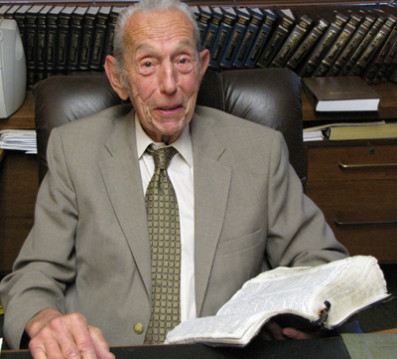
“Apocalypse Later: Harold Camping vs. The End of the World,” a new documentary by independent filmmaker Zeke Piestrup, 41, serves up an intimate view of the supposed “last days” among Camping and his followers atFamily Radio. The film is available through iTunes and on demand via Amazon, AT&T U-Verse, Google Play and more.
Piestrup discussed the project in a recent interview. Some answers have been edited for length and clarity.
Q: How did you, a self-described “nonbeliever who is down with Jesus,” get interested in Harold Camping and Family Radio?
A: I am a geek for all things Christian culture and for biblical scholarship, and Harold was the perfect opportunity for me to mix those two. Mainstream media paints things in easy paradigms, like atheists versus Christians, but this story was so much more than that. And I am a serious geek for Christian radio, so I listened to Harold, I was a big fan. So I wrote to Family Radio and offered to do daily videos for them as a countdown to the date and that’s how we got in there. It was a total blast.
Q: Camping was a polarizing figure. He had, perhaps, millions of followers, but many of them gave up everything for him and he was wrong. Why make a movie about that?
A: I wanted to look at how far back the history of predicting the end of the world goes. And it goes all the way back to the Bible, to Jesus and before. If we don’t look at its origins, then we are doomed to repeat it, are we not? Fewer lives would be ruined if we come to grips with where this really comes from.
Q: One of the things I love about your film is you show that predicting the end of the world was not about money for Camping. He lived in a modest home, drove a Buick and his living room furniture was held together with duct tape. If it wasn’t about money, what was it about?
A: I think for Harold it was ego. He told me a story about living with some college students when he was young and their conversations always turned theological and it was very important for him to ‘win’ those arguments. And attention. Attention and at the same time a serious, incredible love of the Bible. Like Sue (Camping’s daughter) says in the film, he loved nothing more than to talk about the Bible and figure out this riddle and he really felt his civil engineering background would help.
Q: Camping died last year, and Family Radio has had to sell off many of its assets. Is that Camping’s legacy?
A: I see it differently. I think by any measure Harold is a great American. He is the son of poor, immigrant parents, graduates with a civil engineering degree from Berkeley, starts a successful construction business, sells it in his 30’s to build Family Radio from one FM station and he built it into a worldwide ministry. If you look at that arc, that is a great American. But I guess he blew it up in the end. Family Radio’s future is in doubt.
Q: You humanize Camping by filming him in his own setting – at Family Radio, in the pulpit, in his living room. At the same time, you show scholars and other preachers who berate and revile him. There is a real balance. And at the end, when he is debilitated by a stroke and the humiliation of being wrong, you say goodbye to him with a hug. What has been the reaction to that?
A: I debated a long time about including that, but I am glad I did. And people react to that in a strong way, this idea that you can show compassion and love for someone that you don’t agree with, and I don’t agree with Harold. But you can be ideologically opposed to someone and still show compassion for them. It was spontaneous. I put him through a long interview and he was really kind, it was over and I said, ‘Let me give you a hug, man.’






